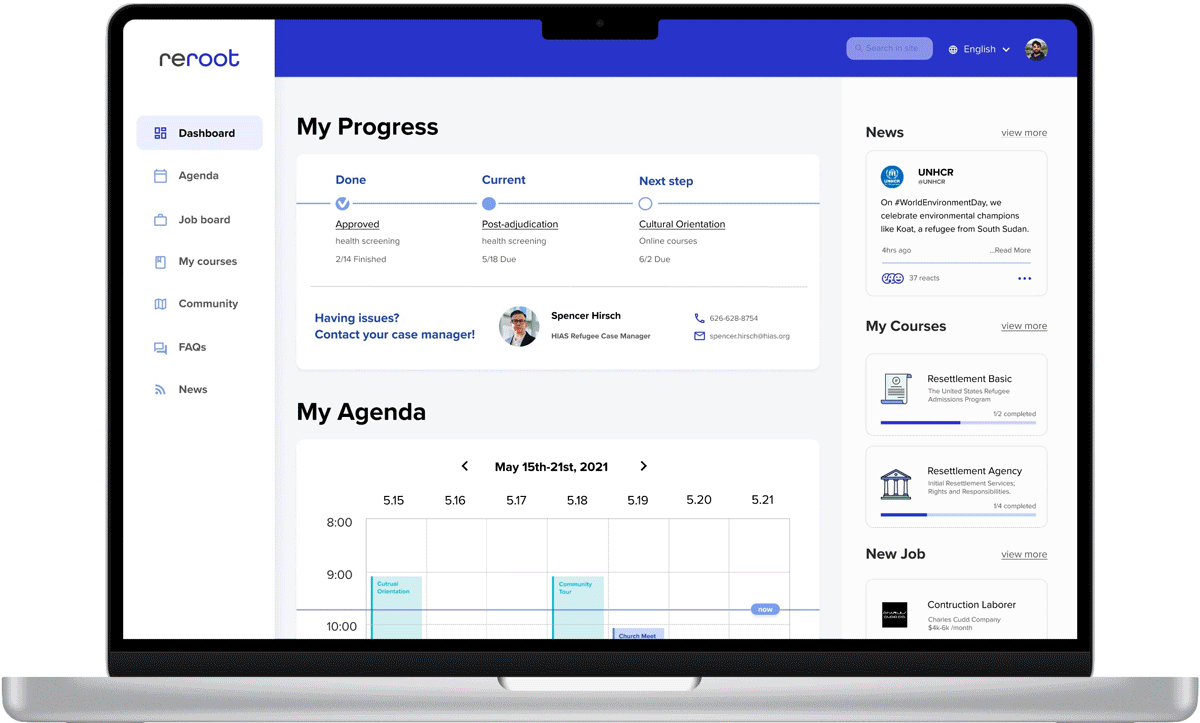
Motivation/Inspiration:
My previous internship experience at the United Nation Refugee Agency provided me a different lense to understand refugees and their situations in the US. By working on different refugee programs and communicating with them face to face, I learned a lot and I would like to use my expertise in interaction to develop an possible solution that would improve their adaptation & life in the U.S.
Year:
2022
Duration:
4 months
Type:
Website
Role:
Individual Project
Problem statement
In the US, the resettlement of new refugee immigrants are always hard because of barriers such as language, culture and finding a job.
Refugees are people who have fled war, violence, conflict or persecution and have crossed an international border to find safety in another country.
In 2022, around 19,919 refugees are admitted to the USRAP(The U.S. Refugee Admissions Program) and resettled in the US.
Results show that refugees were twice as likely to be unemployed. Lack of language skills was one of the biggest barriers.
Once resettled in the US, refugees may face stressors in four categories: Traumatic Stress, Acculturation Stress, Resettlement Stress, and Isolation.
Digital Solution
An official information system that connect refugees (information seekers) with NGO workers (information providers) to close the information gap and help them reroot in the US quickly and smoothly.
By creating a integrated platform, refugees can get access to information & resources much easier. Meanwhile, NGO officers can manage each case clearly and provide help & resources more directly.
Main Features
For Refugees (information seekers)
01
Overview of the application progress and documents requirements.

02
Refugee inside network for job search & opportunities

03
Free online resources including culture orientation(language training) and career related skills.

04
Digital knowledge library providing answers & solutions to all frequently asked questions

Secondary Features
For NGO officers (information providers)
01
Overview of the refugees application progress the officer are responsible for, quick access to contact them.


02
Refugee inside network for job listing & opportunities


Primary Research
In order to understand the complicated process and dilemma refugees are facing, I used several research methods trying to get the most accurate information.

Persona:
Identifying specific use cases through personas helps us better scope our service.


User Journey
Get to know the process of refugee going through the application...
Before a refugee was approved to the resettlement program in the U.S.

After approval, the journey of a refugee entering US and "REROOT"

What we heard from refugees
"We started our lives here from zero. Everything is an adjustment for us; we need more time to get our lives back on track"
“I want people to talk to me like a person, not like a refugee. I’m not pitiful.”
“I’m not here to take advantage of the system, and I’m not here as a tourist – I want to contribute to society and work for the money I get.”
Competitor Analysis
Getting to know what the existing resources society has offered help us get a better idea of the design opportunities.

Affinity Mapping Possible Features
-
For refugees

-
For NGO officers

Research through Kano Model
In the Kano Model approach, I'm able to prioritizing features on a product roadmap based on the degree to which they are likely to satisfy users.

Highlighted Features
-
Multilingual - provides up to 8 languages for refugees from different countries.
-
Timeline of application progress - access to directly check status, upload required documents.
-
Contact of NGO case manager who's incharge - provide better communication & trying to close the information gap.
-
"Reroot learning" - provide online language courses and in-demand professional skills courses.
-
"Reroot LinkedIn" - provide an inside platform for more specific job search & opportunities for refugees.
-
FAQ site - provide answers to 1000+ frequently asked questions that refugees met along the REROOT process.
Wireframes









Identity Design
Logo
reroot
Color Palette
Font: All Round Gothic
#0D5EBA
#8CA8E9
#4EBECD
#ABD6DE
#FFFFFF
#000000
Font - same as the official font for UN Refugee Agency
Header - Proxima Nova Bold
ABCDEFGHIJKLMNOPQRSTUVWXYZ
abcdefghijklmnopqrstuvwxyz
!@#$%^&*()
Body - Proxima Nova Regular
ABCDEFGHIJKLMNOPQRSTUVWXYZ
abcdefghijklmnopqrstuvwxyz
!@#$%^&*()
Interactive Prototype
For refugees

For NGO officers

Next Steps
If I had more time, based on the research I had done, these are the steps I may push forward to refine this project.
-
Include more audience/users
- According to my research, not only the NGO officers are interested in these related works. People like former refugees who already "rerooted" in the US, volunteers from community or NGO are also interested in helping refugees in their own ways. -
Develop more features/details
- I don't want this platform to become only a transaction tool for refugees, instead it should become a long-term support for them. Being approved as refugee and enter US is just only a small part of of their journey, I also want to cover their life after their arrival- school life, getting a job and adapting in, which are more important and complicated. Right now we don't have those details for those experiences, like online video conferencing, taking classes and job interviewing. We can definitely refine those features in the future.